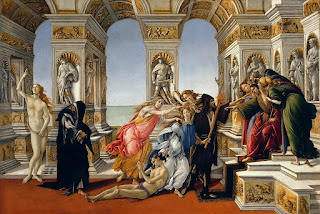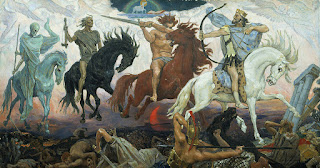Effectively Addressing Immorality - Part Three
Is that question philosophical, musical, mythological or mainly associated with locksmithery and/or clockmaking, in your view?
Identifying the key to the future is likely to be useful if you are required to search for it, and possibly even use it to unlock or wind up something, or to lock up something, or someone.
Perhaps you believe there there are several keys to the future rather than only one.What do you know about the key to Frugality Cottage, and where did you acquire that knowledge?
Perhaps you are unaware that that key is the key to the future.
If you are yet to catch up with the first two parts in this series, please do so now, if at all possible.
There is much work ahead of you if you are to address immorality effectively, and therefore successfully, and turn back the Domesday Clock to a position of safety.
Will you require the assistance of a clockmaker, a locksmith or another sort of expert?
Perhaps you carry a small, rectangular computational device around with you and use is somewhat like a pocketwatch.
What do you know about grandfather clocks and grandfather clauses?
What do you know about pendulums?
What do you know about the key of G major?
In which key do you find it easiest to sing, if any?In which key, if any, do you sing most convincingly, and to whom?
Perhaps you prefer singing a non-Western scale.
What do you know about musical temperament, your natural temperament and tempera paintings?
What do you know about naturalistic art, and how do you know it?
What do you know about naturalistic politics, and how do you know it?The Revolutionary Climatological Needlepoint Committee obviously has many additional questions for you, particularly as you are yet to be regarded by any of its members as worthy of the leadership position required of you in the world of ordinary mortals.
What is your acquaintance with ekphrasis?
How do you picture the future?
What is your acquaintance with literary allegories and mathematical allegories?
What do you know about Midas?
How and when do you attempt to gain an acquaintance with the history of anyone or anything?
How do you separate fact and fiction when assessing anything?What do you know about perfidy and other forms of conspiracy and deception?
Perhaps you regard all fiction as deception.
Perhaps you regard all art as deception.
How do you regard nuclear weapons and other weapons of mass destruction?
How do you regard various abuses of power and other forms of aggression?When, if ever, have you been a victim of malicious falsehoods?
When, if ever, have you believed malicious falsehoods to be true, either of yourself or another person, or even of a group or organisation?
When, if ever, have you known about wrongdoing but been regarded as a malicious liar for telling the truth?What do you know about global catastrophic risk and local catastrophic risk?
What do you know about personal disasters and political disasters and interpersonal disasters and environmental disasters?
How do you compare images of clocks with dangerous beliefs relating to apocalypticism?
What do you know about truth?
What are your beliefs about repentance?
When have you experienced feelings of guilt, and why?
How do you usually ascertain facts?
The Revolutionary Climatological Needlepoint Committee has been attempting to improve your morals for a considerable time now.
How have you been assessing the privileges you are currently experiencing?
What do you regard as the best way to address immorality if not through the withdrawal of privileges?
How do you usually assess the privileges you experience, whether in terms of social emotions or social obligations?
How do you interpret the meaning of the word calumny in various contexts?How do you ascertain moral responsibility in problematic situations?
Perhaps you do not regard a climate apocalypse as a problematic situation for you to address with considerable urgency.
Perhaps your climate clock has stopped even though the real one has not.
What have been your personal experiences of, and in, developed countries and developing countries?
What have been your personal experiences of pandemics, epidemics, natural disasters, emergency incidents, violent crime, mental illness and emergency medicine?
How do you assess morality in relation to crises?What are your usual methods for attempting to overcome psychological stress?
Perhaps one or more of the questions here, or one or more of the images, have caused you to feel shame or fear or confusion.
If that is the case, which memories have arisen to cause such feelings?
The Revolutionary Climatological Needlepoint Committee is never guilty of causing guilt trips, or any other unjustifiable unpleasantness. The committee simply encourages appropriate self-criticism, and critical thinking more generally.
What do you regret, and why?
When, if ever, have you practiced vilification or any other form of maliciousness?When, if ever, have you been accused of defamation for expressing the truth?
What does the word apocalypse mean to you, and why?
Where do you usually locate disclosures of great knowledge?
How do you known when you have located great knowledge rather than big lies?How well developed is your analytical reasoning, and how do you know?
When, if ever, have you provided an apology after being proved wrong about something or someone?
Perhaps you believe your own opinions require no further proof than your own beliefs.
There are many real conspiracies happening in various parts of the world, including conspiracies of silence.
What is your acquaintance with the scientific principle of falsifiability and how do you compare it with the stupidity, and cruelty, of hubris and denialism?
How do you address gullibility and credulity, particularly in relation to deceptive and reckless conduct?How have you assessed your past and present levels of social intelligence?
What do you believe to be the appropriate level of scepticism required in various situations, particularly in relation to journalism, law enforcement and public administration?
You may be aware that denial of possible truths is often a sign of intellectual laziness, as is the denial of possible falsehoods.What is your acquaintance with global issues, and how did you acquire that knowledge?
What do you know about the art and science of perspective?
What, for example, do you know about the Alexander mosaic, and how did you acquire that knowledge?
And what do you know about the Sampul tapestry?
What do you know about the cultural influence of ancient Greek literature in various contexts?
What, for example, do you know about the work of Lucian of Samosata?
What do you know about the cultural influence of Latin literature in various contexts?
What, for example, do you know about the work of Pliny the Elder and Pliny the Younger?
What do you know about the Italian Renaissance?What do you know about the history of art music in various cultures?
What, for example, do you know about Renaissance music?
What do you know about Renaissance architecture?
What do you know about the absence of remorse in relation to immorality?
What do you know about the politics of justifiable and unjustifiable resentment?
How are you preparing for, and or preparing to prevent, societal collapse in various parts of the world?
How are you addressing existing evidence of societal collapse in various parts of the world?
Why do so many politicians and other powerful people behave as though they have no concern whatsoever for the victims of wrongdoing and other disasters?
What do you know about the politics of disgust?
What do you know about the politics of righteous indignation?
What do you know about eschatologies in that regard?
Perhaps you equate eschatology with scatology, literally or figuratively, especially if your suffering has been justified by another person's non-factual beliefs.
The Revolutionary Climatological Needlepoint Committee seeks to ensure you are adequately aware of the prejudice in the world.There are, of course, many persons with an inability to distinguish between reasonable and unreasonable disagreements, particularly concerning their own beliefs and practices. Such people are apparently incapable of distinguishing between knowledge and opinion.
How do you attempt to maintain an accurate perspective?Perhaps you have sought the assistance of Leon Battista Alberti in that regard.
What do you know about the relationship between mathematics and art?
What do you know about the relationship between mathematics and music?
What do you know about mathematical beauty?
What do you know about the career of Apelles?
How do you interpret allegories, and why?
How do you interpret The Story of Lucretia, and why?
How do you interpret The Calumny of Apelles, and why?























Comments
Post a Comment